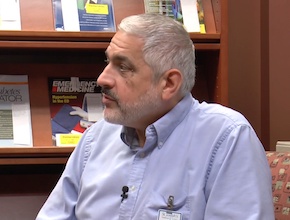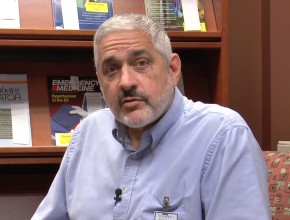References
Colorectal Cancer Screening. Cancer Care Ontario. https://www.cancercare.on.ca/pcs/screening/coloscreening/?WT.mc_id=/colorectalscreening. Accessed June 16, 2017.Roman Jaeschke: Do you know what was compared against what in terms of efficacy of fecal occult blood testing, sigmoidoscopy, and colonoscopy?
David Morgan: There are prospective studies on sigmoidoscopy alone. There are prospective studies on the fecal occult blood test, or guaiac testing, where there is an enzymatic change that is used to detect blood. There are prospective studies for fecal immune testing, where more and more places are switching from the enzyme-based guaiac test to the immune test because it is more sensitive. There have been comparisons within those modalities as well.
The big concern that always comes up is why colonoscopies are not used as the screening modality. The largest answer for that is that is has not been proven in a prospective study that the colonoscopy is a good, effective, and cost-effective tool. It does not mean it is not correct and there is indirect evidence that says it is a good screening tool. For example, in nurse-performed flexible sigmoidoscopy studies, where patients who have had a positive polyp [result] go on to have colonoscopy, we found increased polyps. So there is indirect evidence that colonoscopy works. There are several studies under way to look at the effectiveness of colonoscopy as a population-based screening tool, but for the moment, because it is not available for everyone, there is cost involved, there are risks from sedation, there is risk of perforation – for all those reasons, they are not having their prospective data to prove that it is the modality we should be using, and it is not recommended as a provincial population-based tool.
RJ: It sounds like there are many different techniques available and possibly every jurisdiction will have its own rules and regulations about what is acceptable as a screening test. Could you tell us about the differences between Canadian, US – North American – and European-based screenings which are acceptable?
DM: Probably one of the best organized systems is in the UK. It is organized from several different ways. It is organized in terms of who does the test. To become a screening colonoscopist in the UK, you actually have to be certified – you go to a variety of courses, you have to prove that you meet certain standards – so not everyone does the screening test.
RJ: And you, being a gastroenterologist…?
DM: Or a surgeon. So people who are considered colonoscopists, the vast majority of them would be gastroenterologists or surgeons.
In the US, there is much more in the way of colonoscopy that is done, but there is still some flexibility in terms of flexible sigmoidoscopy or the fecal occult blood test and some of that is driven by the payer that you have – the private payer.In Canada, all of the programmatic-based screening is on the basis of stool test, so more and more provinces are switching to the fecal immune testing. In fact, Ontario is planning to move to that as opposed to the guaiac test next year as well, so it is a much more sensitive test. Alberta probably has the best set of data on what has happened after they have made the switch from guaiac testing to fecal immunochemical test (FIT), and those are quite interesting results as well. The big questions are, if you are going to get screened, what would you have done, why would you not choose a colonoscopy? Some people do not want colonoscopies, and that is one of the advantages of having flexible sigmoidoscopy available. You do not have to take time off from work, you do not have to drink a prep, you do not have sedation, you can drive yourself back and forth, and many patients choose that as a modality.
The fecal occult blood testing program is one that has become more efficient and more bought into, if you want. Over the last number of years, there has been a new Cancer Care report that is coming out at the end of the month that gives all the latest numbers in terms of the number of people that participate in different cancer screening programs. Traditionally, we have had a problem in that not as many people would participate in the stool test, as would go, say, for breast cancer screening; the numbers for breast cancer screening are higher. So we know there is room to move further and we know that when people do use FIT, the accessibility goes up by about 15% to 17%.
RJ: We will go back to FIT, but in the meantime could you tell us what is the efficacy of those programs? How much good they do? Not necessarily against each other.
DM: Against doing nothing, you could reduce your risk of colon cancer by way more than a third, depending on what you are having done. It also depends on the population you are looking at: in a higher-risk population, you are more likely to find something, so if you narrow it to those specific people, your risk reduction will be higher. When they have looked at these different tests, they have shown quality-adjusted life years improved, they have shown that the colon cancer risk goes down, and in fact we have seen reductions in colon cancer in Ontario since the screening program was initiated. Out of the various tests that have been looked at, they have shown that there is an advantage to being screened and you can reduce your risk substantially by having the test – a test – done.
RJ: But as you said, colonoscopy has not been tested in that way.
DM: It has not been tested randomized yet, but there are tests undergoing. Certainly 10 years from now we will have the various answers that we need.
RJ: Unless we have a different test in the stool by that time.
DM: There are other tests out there that people have looked at that are not recommended, for example, virtual colonoscopy, the computed tomography (CT) test, that is not recommended. Barium enemas that we used to do are now recommended not to be done, and in fact in places like Hamilton it is difficult to even get a barium enema anymore. There is DNA testing that people have looked at, and again, this holds a number of interesting possibilities but is not ready for prime time yet.
RJ: The CT colonography that you mentioned: if some patients are for whatever reason not willing to undergo a scoping procedure, is it a mistake to order such CT colonography?
DM: It is not recommended as a screening tool. It certainly will pick up big lesions, and I am always impressed with the CT colonography results that we get back. When they describe that they have got a finding and you go in with the colonoscopy, it is almost always exactly as they described. So it is quite good, quite sensitive, very much operative-dependent. We are lucky in Hamilton that we have got very good radiologists that give us very good results.
RJ: One number that you mentioned is roughly a one-third reduction in colon cancer or colon cancer deaths?
DM: Those would be in colon cancer deaths; particularly the numbers of colon cancers are quite similar to that, but again, it depends on the population that you actually pick the numbers from.
RJ: And we do not really have much evidence which of those tests is better than the other.
DM: They are very similar in terms of their results. The most important thing is to get a test. People have certainly argued which one is better, in terms of whether it is cost or accessibility, acceptability, or whatever; there is a debate around that, but we know that people that are getting something done do a lot of better than people that do not do anything.
 English
English
 Español
Español
 українська
українська




